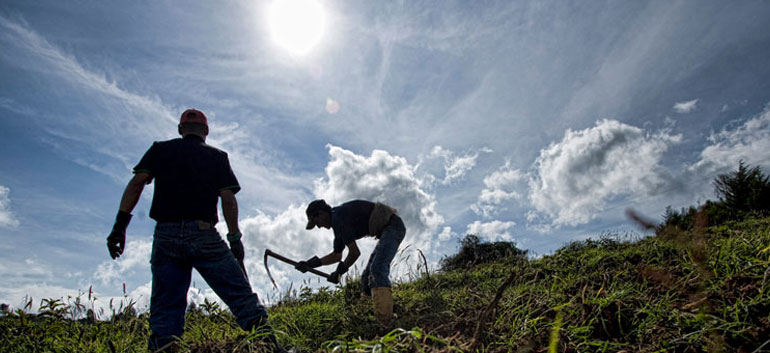Leaders of Colombia’s national agrarian movement are reorganizing as the Colombian government has failed to deliver on promises made as a result of national strikes and negotiations.
One year after the beginning of intense national strikes, farmers claim to still be waiting for resolutions promised by Colombia’s President Juan Manuel Santos.
According to Cesar Pachon, spokesperson and leader of the “Agrarian Dignity” (Dignidad Agropecuaria) movement, farmers have not yet received refinancing credit, despite the fact that refinancing law was approved in December 2013.
Two laws have been adopted to regulate the agrarian refinancing credit: Law 1694 of 2013, approved in December, and the Reactivation of the Agrarian Sector Law, approved in June of 2013.
The refinancing of small farm debt was one of the issues raised by Agrarian Dignity in the national protests that started in August 2013 and left five dead and hundreds hospitalized or jailed.
MORE: So, what are Colombia’s farmers’ demands to end their strike?
Claiming that government has failed to implement the agreed upon measures from August 2013, farmers took their demands to the streets once again in April 2014, a month before the first round of presidential elections.
MORE: Colombia’s farmers begin national strike, government deploys 10K police
In spite of failing to reach an agreement with the government in April’s demonstrations, farmers had suspended strikes until the end of the presidential elections.
MORE: Colombia govt reopens dialogue with farmers as strikes called off for elections
The strikes, however, were never re-initiated after the second round of presidential elections in June, and according to Pachon, there will be no upcoming strikes for the moment as farmers are looking for other ways to effectively solve the country’s agrarian problems.
“For now we are trying to organize ourselves better. We will have regionals and national congress in which we will draw some guidelines and directives and strengthen (the agrarian dignity),” said Pachon.
According to the Agrarian Dignity leader, Santos’ government did not respond to farmers’ demands after the presidential elections, and no talks or negotiations have taken place ever since.
Furthermore, Pachon expressed the farmers’ preoccupation with the newly-elected Agriculture Minister, Aurelio Iragorri Valencia, saying that “unfortunately the appointed [agriculture] minister is the one who used to be the interior minister, and it is him who damaged the agrarian process in the negotiations.”
According to President Santos, “The minister of agriculture will be extremely important in the next four years, because we are going to concentrate much of our efforts on budget and public policy.”
MORE: Santos appoints Colombia’s new ministers of interior, agriculture
The Agrarian Dignity leader claimed that Iragorri used “dirty ways” to defame farmers, including linking them to guerrilla organizations, which subsequently generated security issues.
During April’s strikes, the United Nations’ humanitarian coordinator, Fabrizio Hochschild, said that if the government stigmatized the protests, it could incite violence that would be detrimental to reaching a solution to the problems leading up to the second rural strike within a year.
MORE: UN urges Colombian government to avoid stigmatization of agrarian strike
Sources
-
Interview with Cesar Pachon (Colombia Reports)
- Presidente Santos designo ministros del Interior y Agricultura, y Directora del Icbf (Office of the Presidency)
- Congreso aprueba Ley de Financiamiento del Agro para consolidar reactivación del campo colombiano ( Finance Ministry)
- Law 1964 of 2013 (Office of the Presidency)


